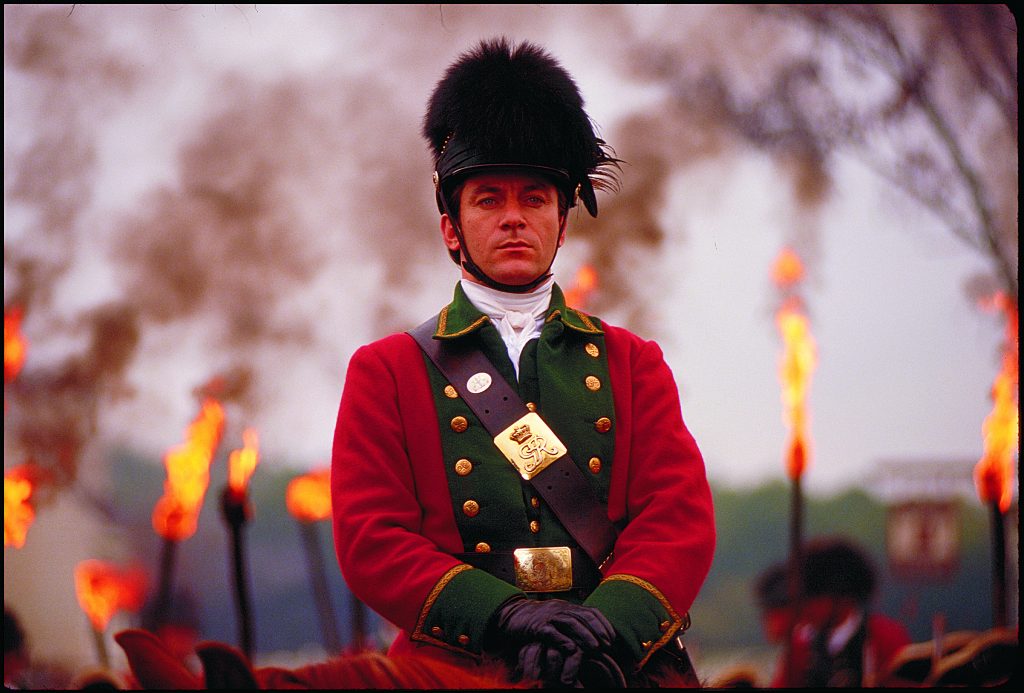Jason Isaacs seems like a nice guy. He was wholly amiable when I interviewed him in 2018 about The Death of Stalin, and though he has a bit of a reputation for saying too much to the press, he’s yet to do anything in his professional and personal lives to brand him as a real-life heel.
On screen, however, it’s a different story. One of cinema’s most untrustworthy presences, Isaacs honed his villainy throughout the 1990s in BBC series (Taggart; Inspector Morse), TV movies (Loved Up), plays (1953), and Paul W.S. Anderson joints (Soldier). Primarily niche audiences saw those performances, but in summer 2000, millions of moviegoers experienced his odiousness in Roland Emmerich’s The Patriot (which turned 25 on June 28). Despite going on to play a variety of roles, including a drag queen immediately afterwards in Sweet November, this meaty supporting turn introduced Isaac’s vile qualities to the masses and established him as a reliable antagonist.
From the instant his Col. William Tavington appears, The Patriot experiences a noticeable tonal shift. A fictionalized version of British Legion commander Banastre Tarleton, this man with deep-set eyes and a resting frown, walking down the freshly seized Charlestown, South Carolina courthouse steps beside Gen. Lord Charles Cornwallis (Tom Wilkinson) looks oddly reptilian, as if he’s part velociraptor.
Yet before we even know Tavington’s name and the evil he’s capable of, the filmmakers stack the deck against him. Though viewers know the outcome of the Revolutionary War, all but the most cynical are rooting for the Continental Army and opposed to any Redcoats (and loyalists) standing in their way. Plus, Robert Rodat’s script makes it downright impossible not to be invested in the survival of kindhearted widower Benjamin Martin (Mel Gibson) and his seven children, particularly once Tavington causes them pain.
In addition to such vicious actions as ordering the Martins’ house and stables burned as punishment for the hosts harboring rebels — disregarding that they were severely injured, cared for alongside wounded British soldiers — Tavington solidifies his loathsome nature by murdering young Thomas Martin (Gregory Smith) for boldly attempting to free his captured soldier brother Gabriel (Heath Ledger) from being dragged away for hanging.
Few crimes are more despicable than child homicide, and the lack of remorse Isaacs conveys during and after this horrific deed suggests that we’re dealing with a sociopath. And it’s not as if this is SOP for the British Army. The shock this killing elicits in the first British officer on the scene — who thanks the Martins for giving his comrades medical attention — and Cornwallis’ subsequent reprimand of Tavington’s “brutal tactics” after witnessing the Colonel slicing at enemy soldiers with a saber show that his conduct is unbecoming of an officer in King George’s service.
Sidelined and forced to play by the rules, during which he sulks about like a chastised schoolboy, Tavington is given a second chance to break bad after Benjamin embarrasses Cornwallis. And, boy, does he capitalize on it! Endorsed by his superior to go rogue, Tavington punishes the militia under Benjamin’s command by attacking those they love most — an easy task for someone seemingly without a family and incapable of love.
With his piercing blue eyes, arched brows, and sharp facial features, Isaacs wields an almost unfair naturally villainous appearance and often accentuates it with a simple narrowing of the eyes or a snarl. As Tavington ramps up his revenge, Emmerich amplifies these qualities through numerous close-ups of Isaacs and by employing multiple uses of slow-motion, stoking viewer hatred for this repugnant excuse for a man and occasionally making one wonder if he is indeed human. A walking insult to the fledgling United States of America themselves, Tavington is essentially a British Terminator who can only be stopped via elimination.
Though The Patriot received modestly positive reviews, Isaacs’ performance was frequently cited as one of the film’s strongest assets. And after it became the 15th highest grossing domestic release of 2000, earning $113 million in the U.S. and $215 million worldwide, Isaacs was predictably offered numerous bad guy roles but didn’t accept any until the one-two punch of Lucius Malfoy in Harry Potter and the Chamber of Secrets (2002) and Captain Hook in Peter Pan (2003).
When Isaacs’ casting in each film was announced, it was tough to fault the decision. Unlike the wealth of disposable summer blockbuster evildoers, Isaacs’ Tavington left such a strong impression that, a handful of years later, anticipation for these projects grew thanks to the value added by his involvement. And a similar optimism has endured throughout Isaacs’ career.
While he’s typically featured in smaller supporting parts, whenever and however Isaacs shows up, it’s instinctual to approach him with hostility, presuming him guilty until proven innocent. In the event that such fears are realized, one’s Isaacs-specific Spidey-sense merits praise for correctly being on high alert. But even when he plays nice, the suspenseful anticipation that his current character just might flash a little Tavington elevates the overall work in that hyper-specific way — and we have the urtext of The Patriot to thank for that inherent distrust.
“The Patriot” is available for digital rental or purchase.

